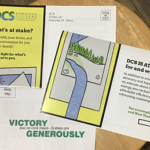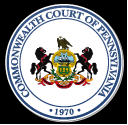
DCS Comments at Nov. 13 DRBC Hearing on Rule Changes
November 14, 2023
DCS is at WORK for and with YOU!
December 10, 2023Governor Shapiro will appeal the Commonwealth Court decision to the PA Supreme Court.
Download this Blog post as a pdf.
The Commonwealth Court’s decision can be found here.
Carbon dioxide (“CO2”), a greenhouse gas, is accelerating climate change, with drastic consequences. CO2 emissions need to be cut, or eliminated. Large fossil fuel plants have, for decades, dumped CO2 into the atmosphere with impunity and without charge, leaving citizens and the environment to suffer the consequences.
Incredibly, while in office Pennsylvania’s former Governor Wolf decided that it was fair and beneficial to the citizens of the Commonwealth to charge for this atmospheric CO2 dumping and invest the proceeds in clean air programs. He was guided by the success of an initiative by other states in the Northeast to charge for greenhouse gas dumping and invest the proceeds into community beneficial programs. Governor Wolf issued an Executive Order mandating Pennsylvania to join this Regional Greenhouse Gas Initiative (RGGI, pronounced “Reggi). It was very exciting that Pennsylvania, one of the nation’s largest fossil fuel producers, wanted to join RGGI and be a part of a climate change solution.
It took PA Department of Environmental Protection (DEP) about four years to develop regulations governing its participation in RGGI. In 2022, however, when Pennsylvania was about to join RGGI, opponents got serious.
What is RGGI?
RGGI is best explained by analogy to a local dump that opens down the street, into which big companies dump toxic garbage. No one oversees the dump, and as it grows exponentially bigger, everyone living around it gets sicker. Here, the atmosphere is the dumping site, and CO2 is the toxic garbage. Large fossil fuel energy plants, the dumpers, have been dumping CO2 into the atmosphere at no charge for decades, and degrading the environment in the process.
RGGI is designed to serve as the regional gatekeeper to this atmospheric dump. It both charges fees for the dumping privilege and caps the total amount of CO2 permitted to be dumped, referred to as the allowance. By charging fees RGGI incentivizes large energy plants to modernize and reduce the amount of CO2 pollution they generate. The cap of total CO2 allowances sold in a year is lowered periodically, resulting in ever-declining permissible emissions levels of CO2. According to its website, RGGI.org, RGGI has reduced emissions reduced by more than 50%—twice as fast as the nation as a whole.
The DEP estimated that Pennsylvania’s participation in RGGI would prevent 227 million tons of CO2 pollution by 2030. According to an NPR’s StateImpact Pennsylvania article (November 2023), that’s like taking 44 million cars off the road for one year.
RGGI now includes 11 states: Connecticut, Delaware, Maine, Maryland, Massachusetts, New Hampshire, New Jersey, New York, Rhode Island, Vermont, and Virginia. Pennsylvania could be the 12th State.
RGGI’s system of fees and allowances has, since its inception in 2009, raised $6 billion that the participating states share and invest in programs that benefit their local communities. Pennsylvania has earmarked its RGGI proceeds for air pollution control programs. That could include job retraining and clean energy projects.
RGGI does have detractors. Some critics argue it could do better, provide greater incentives to reduce CO2 emissions, and so on. Others do not want any regulation to restrict fossil fuel production. Virginia’s current governor, for example, is trying to withdraw Virginia from participating in RGGI. New Jersey, under ex- Governor Christie, did withdraw, and then, after Christie left office, rejoined RGGI.
The Lawsuits to Stop Pennsylvania’s Participation in RGGI
Two lawsuits are pending that seek to prevent Pennsylvania from joining RGGI. Three GOP Senators and three GOP House of Representatives (“GOP Intervenors”) intervened in one lawsuit before the Pennsylvania Commonwealth Court. They argued that Pennsylvania could not join RGGI because the CO2 allowance fee was actually an illegal tax, not a fee, which voided the entire program.
Judge Michael Wojnick agreed that the RGGI fee was a tax. He noted that “a fee may constitute a tax where the revenue generated exceeds the costs reasonably necessary to operate the program.” He considered the fees that would be generated by the State’s participation in RGGI to be excessive:
“Where, as here, the moneys generated and received by the Commonwealth’s participation in the auctions are ‘grossly disproportionate’ to the costs of overseeing participation in the program or DEP’s and EQB’s annual regulatory needs, and relate to activities beyond their regulatory authority, the regulations authorizing Pennsylvania’s participation in RGGI are invalid and unenforceable.”
Taxes, unlike fees, are revenue-generating and can only be imposed through legislative action pursuant to Article III, section 10 of the Pa. Constitution. The Court held that DEP’s regulations imposed an unconstitutional tax; Pennsylvania needed “legislation duly enacted by the Pennsylvania General Assembly” to participate in RGGI. This ruling resolved both of the RGGI cases.
Judge Ellen Ceisler, the sole dissenter, thought this decision was premature. In her view the fees imposed by RGGI were a novelty; they might not seem like “fees in the traditional sense, but, by the same token, it is not entirely clear that the proceeds raised thereby would constitute a tax.” She would have preferred for the parties to engage in a robust and fully-developed discussion of the nature of the fees charged under RGGI.
The Commonwealth Court’s disappointing ruling has stopped Pennsylvania’s laudable effort to reduce GHG emissions and clean up the state’s air quality. It also ignores the mandates of the Environmental Rights Amendment.
Governor Shapiro is not a fan of RGGI, but he has announced his intent to appeal the decision to the Pennsylvania Supreme Court. According to his spokesperson, the Governor does not want his executive power to be curtailed. Pennsylvania’s ramping up to participate in RGGI was initiated by ex-Gov. Wolf through an executive order.
Hopefully Judge Wojnik’s ruling will not be the last word on Pennsylvania’s participation in RGGI.
Jacqueline Sailer is a New York attorney who spends a lot of time on the Delaware river.





1 Comment
Great explanation of something complicated but important. thank you! Fingers crossed that PA joins RGGI.